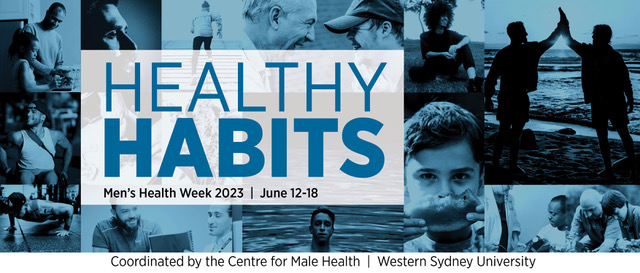
This article was written by FTMA’s Kat Welsh.
FTMA’s member campaign this month has been focused on Men’s Health Week, from June 12-18. ‘Healthy Habits’ is the theme this year, drilling down on men for a holistic approach physically, emotionally, spiritually, and culturally. But it can be overwhelming sometimes to know where to start. Which is why FTMA provided its members this month with
- Posters including 7 Tips to Stay Healthy this Winter, Mateship Infographic and Exercise + Men’s Health Infographic
- Social Images, Facts and Links to events
- A Presentation that comes with interactive speaker notes and slides that can easily be tailored to whoever conducts the talk in your workplace
- Workplace Tips for Winter Healthy Staff with links to workplace health program providers
- F&T Time Podcast Episode – Men’s Health Week
Men’s Health Week began as a United States Congress initiative in 1994, to help raise awareness of health and wellbeing problems that men and boys faced in the community. Many were avoidable diseases, cancers, and mental health issues. The issue was not necessarily lack of services, but lack of comfortability that men had in accessing assistance. The Western Sydney University drive the project here in Australia, along with the Australian Men’s Health Forum and many other organisations focused on normalising men’s health issues and increasing access to supports.
The average life expectancy for men in Australia is 7 years less than women – the leading cause of death is coronary artery disease, followed by dementia and lung cancer. Death by suicide for men is 3 times higher than women. When you think about the prominent causes being disease and contribution of mental illness, the word ‘preventable’ seems highly applicable. In a male dominated industry, it’s critical to talk about the issues impacting so many men and look at what can be done to improve their mental health and wellbeing. Too many times, men shy away from conversations about their mental, physical and social health – it’s time we put a stop to it. It’s time that men get connected. Here are the Men’s Health Week talks from the Australian Men’s Health Forum.
There is so much proof that physical health is deeply impacted by emotional wellbeing. During the 1998 Football World Cup, heart attack rates went up 25% in England the day they lost the match to penalty shoot outs with Argentina! Absolutely NOT suggesting you stop going to the footy but look after your health so you can keep going for longer.
The most important thing you can do is start. But life gets in the way, right? Kids, school runs, getting to work, getting back from work, family responsibilities, bills, cars, insurances, pets, houses, gardens, commitments in the community – I bet you’re feeling pulled apart by it all. And I bet your blood pressure is going up just reading through that list – plus the extras you could add on to it!!
Every one of those things above, needs you to be functioning, and functioning at your best. If you want your kids and loved ones to be happy and healthy, you need to role model that for them. Especially over the Winter months when colds, flus, and seasonal downers are a constant threat. If you make no changes, things won’t improve. So how exactly do we get through the deadly season?
7 Tips for Winter Wellness
1. Nutrition
Good nutrition will give your body the best boost for Winter. Did you know that when you boil carrots for more than 15 minutes they give off a substance that enhances the immune system and supports anti-viral function? There is an abundance of science to prove that everyday foods can be superheros for our body. Get a great soup on the go regularly – which is easy for your body to digest due to the cooking process. Be sure to include carrots, garlic, ginger, and plenty of spices, or make up a great curry / stew / casserole with flu-fighting ingredients – cloves, star anise, black pepper, cumin, cinnamon and turmeric.
2. Health Check-Up
When was the last time you went to the GP and had a health check-up? We tend to only make that appointment when something is going wrong. But we can visit the GP for a check in, especially as we get older – check-ups for blood pressure, heart rate, iron levels, and cholesterol are all essential, and could help pick up something proactively, rather than reactively. Your GP can give you advice about dietary, physical, or mental health needs. We can be incredibly stoic sometimes, but we all need support during our lives, and your GP is the best first contact to consult with.
3. Exercise
It could seem like the last thing you want to do when it’s cold and miserable outside (unless you’re lucky enough to be in the warmer parts of Australia), however, getting some exercise keeps your body strong and re-generating. If we stagnate, our immune systems stagnate.
It’s recommended that we do a minimum of 2.5 hours per week of moderate intensity and 1.25 of high intensity activities. But when it’s belting down with rain the idea of a bike ride, playing golf or going for a walk, goes on the back burner.
What could be a good way of looking after yourself? It could be joining a gym and doing a class or 2 per week. Maybe it’s sticking on a YouTube yoga video? How about getting a group of friends together and signing up for a charity fundraising walk – here is what’s on all over Australia. There’s always the indoor swimming pool. The local community house might have some fitness classes. Or suck it up, get a warm jumper on, a raincoat and the gum boots, and take the dog out for that walk – make sure to keep rugged up if you’re in the colder parts of Australia.
4. Sleep
Yep, plain simple, sleep is what your body needs. Are you getting enough and is it quality regular sleep? There are plenty of studies to show that adults need a definite 7-9 hours each night for optimum health. Lack of prolonged sleep DOES contribute to high blood pressure, heart disease, stroke, cancer, diabetes, depression and anxiety, low energy, irritability, inability to deal with stress, and a lowered immune system.
How can we prioritise our sleep? Here’s a few issues and tips to combat
- Drinking caffeine too late in the day – try and opt for water or caffeine-free drinks
- Eating too late into the evening – heavy meals right before bed won’t let your system rest
- Get off the screens! Keep away from the blue-light-emitting devices at least 90 minutes before bedtime
- Lack of exercise during the day means your body can be restless when it should be restful
- Too much sugar late into the evening can impact your body’s ability to switch off
- Un-comfy mattress / pillow
- And here’s probably the big one… STRESS
5. Stress Less
Stress can severely impact our body and its ability to stay healthy. Especially in Winter when the days are shorter, colder, rainier, muddier – and our knack to ramp up the stress levels can increase.
Make a little bit of time to focus on what triggers stress? How do you deal with it? What works for you? Obviously we can’t eliminate or control all of the situations that create it, but we can control how we try to deal with it. Increase the downtime outside of what creates stress in your life.
Have you listened to the FTMA podcast with Luke Mathers? He authored the book we sent out to members, Stress Teflon. If you haven’t read it, or you’re struggling to find the time to read it, Luke has also released a FREE audio version – available here or through the usual streaming sites.
6. Get Out Into Nature
While many of you reading this are in the timber industry, did you know the proven healing benefits of something called Forest Bathing, or the Japanese practice of Shinrin-yoku? Sounds a bit too hippy? Well click here for scientific proof from Harvard University!
“Some research suggests exposure to natural tree oils helps lift depression, lowers blood pressure, and may also reduce anxiety. Tree oils also contain 3-carene. Studies in animals suggest this substance may help lessen inflammation, protect against infection, lower anxiety, and even enhance the quality of sleep.”
In fact, getting out into any form of nature – bush or beach – impacts our bodies, reduces stress hormones, and helps support our immune system, to keep us strong and clear minded. Pick your favourite outdoor spot and get out there!
7. Supplements
Please don’t rely on Chemist Warehouse’s extensive range of vitamins to keep you healthy over Winter – but it can help enhance and boost your system at critical moments. Be sure to check in with your GP if you have any health issues or are on any medications, before you add in extras.
Here’s some of the top supplements to be proactive, that may help reduce the impact of sickness.
- Vitamin C – best found in fruits and veg, but also of benefit as a supplement, helps your body absorb iron, and other essential nutrients
- Zinc – found commonly in meats, fish and dairy – essential for a healthy immune system and growth of cells
- Olive Leaf Extract – used as a supplement by the Ancient Greeks and packed with antioxidants, OLE has been proved to help cardiovascular health as well as the immune system
- Echinacea – part of the Daisy family, this powerful plant has been used by Native Americans for hundreds of years as a cure-all for wounds, infections, and general health
More than anything, make sure you prioritise yourself and your health this Winter, and going into the future! Do whatever you need, to stay nourished mentally and physically, somehow put yourself first, take pleasure in it, and PLEASE PLEASE access supports – lock in those ‘Healthy Habits’ and let’s change those stats when it comes to disease and mental health.
Our Principal Partners



